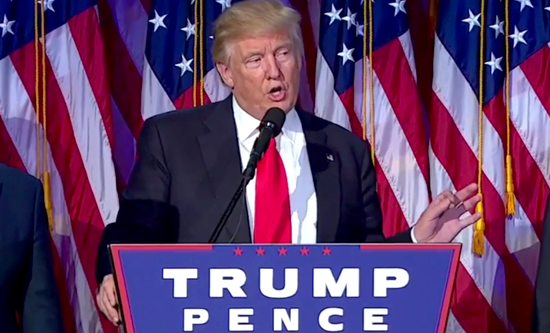
Donald Trump has defied polls, and the immediate hopes of the US ruling class, to win the US Presidential general election. Democrats are shell-shocked, seeming not to realise what has happened and why. Trump supporters are euphoric. Steve Palmer reports.
Immediately prior to his victory the largely liberal media, the US ruling class and the markets were taking comfort from the last minute opinion polls, and, somewhat nervously but more confidently, were expecting a Clinton victory. Clinton was their favoured candidate because she was bought and paid for by Wall Street, and, despite her verbal claims to the contrary, represented business-as-usual. She had a superior ‘ground game’ – the get-out-the-vote machine on the ground – or so they thought. At least the rules of the game would have been clear, the policies would have been pretty-much-more-of-the-same and her election would have represented relative stability and predictability. By contrast, Donald Trump has made extravagant promises to his supporters, railing against free trade, the Washington political machine (‘We’re going to drain the swamp’), Wall Street and oppressed sections of US society. Exactly what policies he will actually pursue once sworn-in in January, is a complete unknown. Combined with his animation of dissident sections of the US working class, and his mercurial temperament, this unpredictability deeply scares finance capital in the immediate short term. This was reflected in the immediate reaction of global financial markets in the US and around the world which have totally cratered.
Trump’s victory is the culmination of the consequences of rampant globalisation and the intensification of imperialist exploitation. These consequences hit the US working class hard, destroying traditional US manufacturing industry and the associated jobs, which fled abroad to China, Mexico and other peripheral countries. The living standards of the working class have remained static or fallen over the past couple of decades. Right-wing demagogues capitalised on this, while self-styled progressives continued to apologise for, cover-up for, and support the Democrats who in the White House and the Senate spearheaded the globalisation drive. Clutching at the racist and xenophobic straws offered by the right-wingers, and disgusted with the pervasive corruption in Washington, the white section of the US working-class drifted away from their traditional support for the Democrats and became increasingly open to the appeals of reactionaries. All this tinder required was the right kind of spark to incinerate the control of the ruling class establishment. Trump was that spark, a man of boundless personal ambition and a political arsonist who was quite prepared to burn the house down to satisfy his personal ambitions.
What will the consequences be, in the short term and the long term, in the US and the world? In the short term, we can be sure that, as with Brexit, there will be a wave of attacks on blacks, gays, Latinos; there will be a surge of racism, Islamophobia and misogyny. Trump’s verbal assaults on trade treaties and Wall Street might depress the dollar and weaken the other financial markets. In Mexico, with 80% of its exports going to the US and one of the three partners in NAFTA (North American Free Trade Area), the Peso has collapsed; the longer term consequences will be increased political and social instability in a country torn by the violence of the drug cartels and corruption of the Mexican ruling class.
However, it is not clear what Trump’s actual policies will be. Trump is a paper billionaire, and is fundamentally pro-business and pro-capitalist. There is no reason not to think that, like all bourgeois politicians, he says one thing to get elected and does something completely different. He cannot simply dictate his policies, but has to work with Congress to get any programme implemented. This means he will have to work with the Republican establishment. His policies and their policies converge in several major respects, particularly business tax reform, the reduction of business regulation, the abolition of Obamacare and the appointment of a reactionary judge to cement right-wing control of the US Supreme Court. Far from undermining capitalism, it is far more likely that, in practice, Trump will work to strengthen it, all the while protesting that he is unable to implement his ‘real program’ because of obstruction from the Washington machine. Also, he can’t get around the fact that US imperialism is stagnating and that even Donald Trump can’t beat the law of value: What US imperialism needs now is to force the standard of living of its working class even lower. What will happen when it eventually dawns on his supporters that he has betrayed them and hasn’t delivered on his promises is the real unknown and, at this point in time, pure speculation.
Internationally, despite all his talk, Trump will still have to promote the interests of US imperialism, so we can expect business-as-usual (wars and oppression) here too, though it is quite possible that the TTIP (Transatlantic Trade and Investment Partnership), already problematic thanks to Wallonian opposition to a similar treaty with Canada, will wither and die. The ‘Special Relationship’ between US and British imperialism will certainly remain intact, as Theresa May has already affirmed. It’s possible that Trump may not be as bellicose towards Russia as the US ruling class has been up to now.
Once again, like Obama, we have a President-elect who has risen to power promising change. In power, Obama proved to be the faithful servant of imperialism and betrayed his supporters. There are no reasons to expect that Trump will be any different.




